日本动漫介绍英语
- 格式:ppt
- 大小:1.57 MB
- 文档页数:1
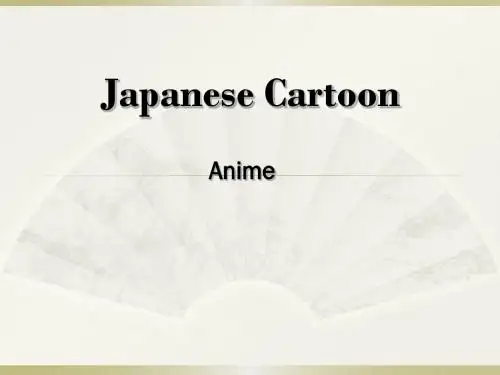
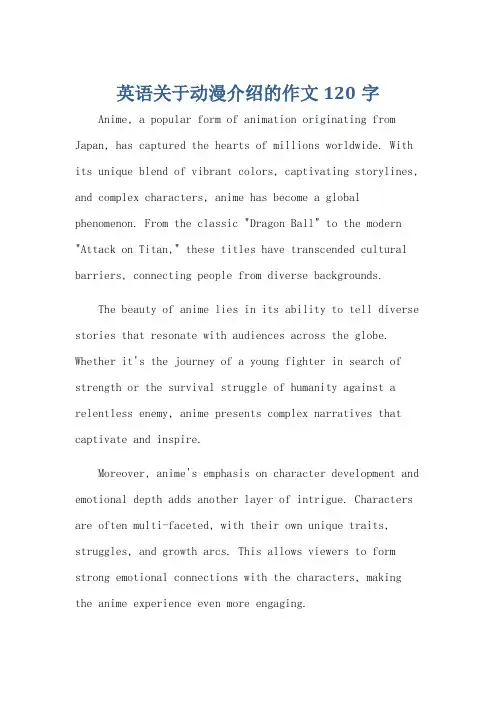
英语关于动漫介绍的作文120字Anime, a popular form of animation originating from Japan, has captured the hearts of millions worldwide. With its unique blend of vibrant colors, captivating storylines, and complex characters, anime has become a global phenomenon. From the classic "Dragon Ball" to the modern "Attack on Titan," these titles have transcended cultural barriers, connecting people from diverse backgrounds.The beauty of anime lies in its ability to tell diverse stories that resonate with audiences across the globe. Whether it's the journey of a young fighter in search of strength or the survival struggle of humanity against a relentless enemy, anime presents complex narratives that captivate and inspire.Moreover, anime's emphasis on character development and emotional depth adds another layer of intrigue. Characters are often multi-faceted, with their own unique traits, struggles, and growth arcs. This allows viewers to form strong emotional connections with the characters, making the anime experience even more engaging.However, anime's popularity isn't just limited to its storytelling capabilities. The art style, music, and voice acting all contribute to the overall charm of anime. The vibrant colors and detailed animations bring the worlds of anime to life, while the catchy soundtracks and emotional voice performances further enhance the emotional impact of the stories.In conclusion, anime is not just a form of entertainment; it's a cultural phenomenon that has the power to connect people from all over the world. Its unique blend of captivating storylines, complex characters, and vibrant visuals make it a must-watch for anime fans and newcomers alike.**动漫的魅力:跨越文化的桥梁**动漫,这一源自日本的动画形式,已经俘获了全球数百万人的心。

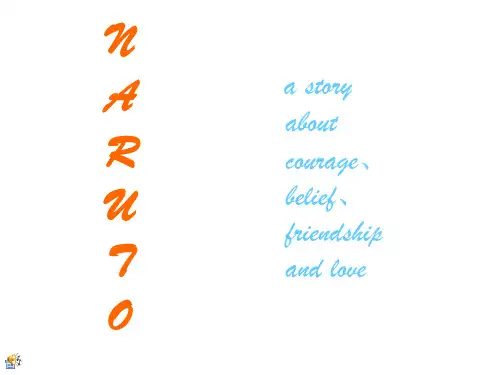

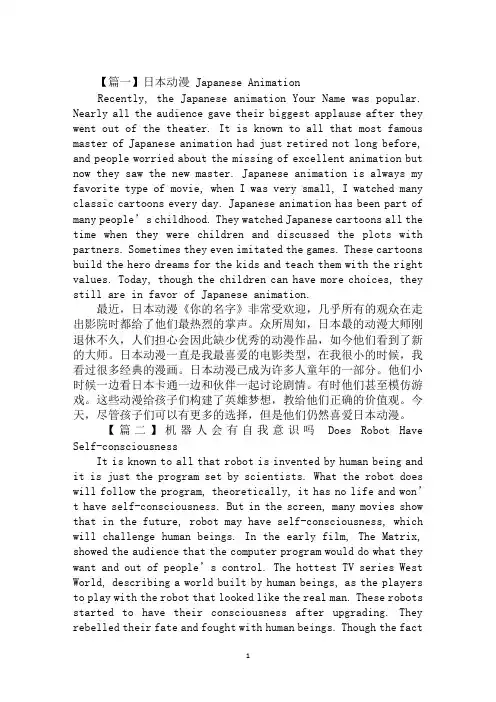
【篇一】日本动漫 Japanese AnimationRecently, the Japanese animation Your Name was popular. Nearly all the audience gave their biggest applause after they went out of the theater. It is known to all that most famous master of Japanese animation had just retired not long before, and people worried about the missing of excellent animation but now they saw the new master. Japanese animation is always my favorite type of movie, when I was very small, I watched many classic cartoons every day. Japanese animation has been part of many people’s childhood. They watched Japanese cartoons all the time when they were children and discussed the plots with partners. Sometimes they even imitated the games. These cartoons build the hero dreams for the kids and teach them with the right values. Today, though the children can have more choices, they still are in favor of Japanese animation.最近,日本动漫《你的名字》非常受欢迎,几乎所有的观众在走出影院时都给了他们最热烈的掌声。
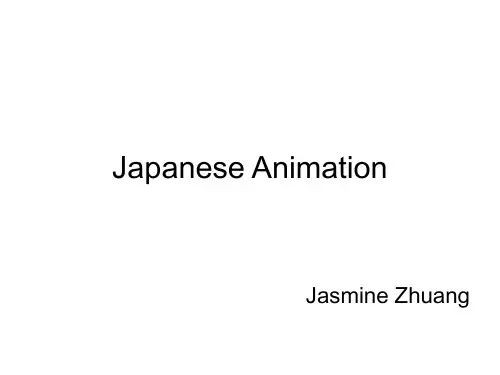
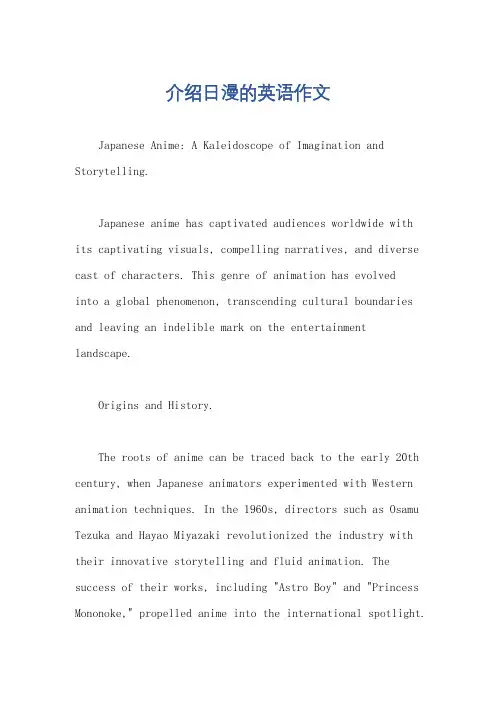
介绍日漫的英语作文Japanese Anime: A Kaleidoscope of Imagination and Storytelling.Japanese anime has captivated audiences worldwide with its captivating visuals, compelling narratives, and diverse cast of characters. This genre of animation has evolvedinto a global phenomenon, transcending cultural boundaries and leaving an indelible mark on the entertainment landscape.Origins and History.The roots of anime can be traced back to the early 20th century, when Japanese animators experimented with Western animation techniques. In the 1960s, directors such as Osamu Tezuka and Hayao Miyazaki revolutionized the industry with their innovative storytelling and fluid animation. The success of their works, including "Astro Boy" and "Princess Mononoke," propelled anime into the international spotlight.Characteristics and Styles.Anime encompasses a vast array of artistic styles, from the exaggerated and cartoonish to the realistic and detailed. Character designs often feature large, expressive eyes and exaggerated body proportions, creating a distinct and recognizable visual aesthetic. The animation is typically fluid and dynamic, with a focus on movement and emotion.Narrative themes in anime vary widely, ranging from action and adventure to romance and slice-of-life. Common elements include the exploration of complex characters, philosophical themes, and the blurring of reality and fantasy. Anime also frequently incorporates elements from Japanese culture, such as traditional festivals, mythology, and folklore.Global Impact.Anime has become a cultural phenomenon, with dedicatedfans in countries around the world. Anime conventions and fan meet-ups attract thousands of attendees, showcasing the enthusiasm and passion for this beloved genre. The global success of anime has led to collaborations between Japanese and foreign studios, resulting in a diverse range of co-productions and adaptations.Anime has also played a significant role in promoting Japanese culture on a global scale. Through its depictions of Japanese society, customs, and traditions, anime has fostered a greater understanding and appreciation for Japan's unique heritage.Economic and Social Significance.The anime industry is a major economic force in Japan, generating billions of dollars in revenue annually. It has created numerous employment opportunities, from animators and voice actors to writers and producers. Anime has also stimulated tourism, with fans traveling to Japan to visit locations featured in their favorite shows.Beyond its economic impact, anime has had a positive social impact, providing a sense of community for fans around the world. It fosters creativity, inspires imagination, and encourages viewers to explore diverse perspectives and cultures.Genres and Subgenres.The anime genre is vast and encompasses a wide range of subgenres, each with its own unique set of conventions and themes. These include:Action: Fast-paced and adrenaline-pumping, featuring intense battles and high-stakes confrontations.Adventure: Explores the unknown, often with a focus on discovery, treasure hunting, and exploration.Romance: Centers on romantic relationships, ranging from lighthearted comedies to epic love stories.Slice-of-Life: Depicts everyday life, exploring themundane and extraordinary moments that shape human experiences.Mecha: Features giant robots controlled by humans, often used in battles or other science fiction scenarios.Fantasy: Immersive worlds filled with magic, mythical creatures, and extraordinary events.Sci-Fi: Explores futuristic technologies, space exploration, and the intersection of science and society.Critical Acclaim and Awards.Anime has received widespread critical acclaim for its artistic excellence, storytelling prowess, and cultural significance. Numerous anime films and series have been nominated for and won prestigious awards, including the Academy Awards, Golden Globes, and Emmys. Directors such as Hayao Miyazaki, Makoto Shinkai, and Mamoru Hosoda have gained international recognition for their groundbreaking contributions to the genre.Conclusion.Japanese anime has emerged as a global cultural force, captivating audiences with its visually stunning animation, engaging stories, and diverse cast of characters. It has not only achieved commercial success but has also fostered a sense of community among fans, promoted cross-cultural understanding, and inspired generations of artists and storytellers. Anime continues to push boundaries, expandits reach, and leave an enduring legacy on the entertainment landscape.。

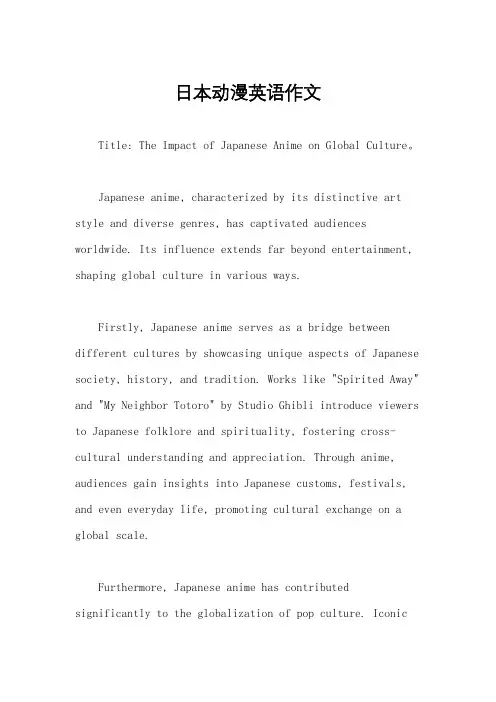
日本动漫英语作文Title: The Impact of Japanese Anime on Global Culture。
Japanese anime, characterized by its distinctive art style and diverse genres, has captivated audiences worldwide. Its influence extends far beyond entertainment, shaping global culture in various ways.Firstly, Japanese anime serves as a bridge between different cultures by showcasing unique aspects of Japanese society, history, and tradition. Works like "Spirited Away" and "My Neighbor Totoro" by Studio Ghibli introduce viewers to Japanese folklore and spirituality, fostering cross-cultural understanding and appreciation. Through anime, audiences gain insights into Japanese customs, festivals, and even everyday life, promoting cultural exchange on a global scale.Furthermore, Japanese anime has contributedsignificantly to the globalization of pop culture. Iconicseries such as "Naruto," "Dragon Ball," and "One Piece" have garnered massive international fanbases, transcending language barriers and geographical boundaries. Cosplay conventions, fan art communities, and dedicated online forums thrive worldwide, uniting fans who share a passion for anime. This interconnectedness has facilitated the spread of Japanese culture beyond its borders, influencing fashion trends, music, and even language.Moreover, Japanese anime serves as a medium for exploring complex themes and social issues. Many anime series tackle topics such as friendship, identity, and the human condition with depth and nuance. For instance, "Neon Genesis Evangelion" delves into existentialism and psychological trauma, while "Attack on Titan" explores the consequences of war and discrimination. By addressing these themes, anime prompts audiences to reflect on their own lives and societal norms, sparking meaningful discussions and promoting empathy.Additionally, Japanese anime has spurred innovation in the entertainment industry through its groundbreakinganimation techniques and storytelling methods. Studios like Studio Ghibli, Madhouse, and Production I.G. are renownedfor their visually stunning animation and narrative depth. Their influence can be seen in Western animation as well, with filmmakers and animators drawing inspiration from Japanese techniques. This cross-pollination of ideas hasled to the evolution of animation as an art form, pushing boundaries and setting new standards for creativity.Despite its widespread popularity, Japanese anime also faces criticism and controversies. Some argue that certain anime perpetuate harmful stereotypes or containinappropriate content, leading to debates about censorship and cultural sensitivity. However, these discussions contribute to a greater awareness of media representation and the importance of responsible storytelling.In conclusion, Japanese anime has left an indeliblemark on global culture, serving as a catalyst for cultural exchange, fostering community, and sparking creativity. Its influence extends beyond entertainment, shaping perceptions, and inspiring audiences worldwide. As anime continues toevolve and diversify, its impact on global culture is likely to endure for generations to come.。

日本动漫英语作文I love Japanese anime because it always has such unique and interesting storylines. The characters are always so well-developed and you can't help but get attached to them.One of my favorite things about Japanese anime is the beautiful animation. The colors are always so vibrant and the attention to detail is amazing. It really brings the characters and the story to life.I also appreciate the diversity in Japanese anime. There are so many different genres to choose from, whether you're into action, romance, comedy, or something else. There's always something for everyone.Another great thing about Japanese anime is the music. The opening and ending songs are always so catchy andreally set the tone for the show. And the background music always enhances the mood of the scenes.Japanese anime has a way of making you feel so many emotions. You can go from laughing out loud to crying your eyes out in a matter of minutes. It's a rollercoaster of emotions that keeps you hooked.Overall, Japanese anime is just so entertaining and engaging. It's a form of escapism that allows you to immerse yourself in different worlds and stories. It's no wonder it has such a huge fanbase all over the world.。